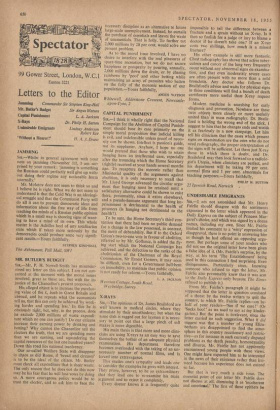CAPITAL PUNISHMENT SIR,--I think it wholly right that the National
Campaign for the Abolition of Capital Punish- ment should base its case primarily on the simple moral proposition that judicial killing is evil, and indefensible unless proof of neces- sity can be shown. Intellect is passion's guide, not its supplanter. Anyhow, I hope no one would pretend that those who wish to retain hanging have an intellectual case, especially after the trouncing which the Home Secretary (rightly) received at your hands several months ago. To recapture the moronic rather than Ministerial quality. of the arguments against abolition, it is only necessary to recall that Mr. Lloyd George advanced the circular argu- ment that hanging must be retained until a satisfactory alternative could be shown to exist (here, presumably, since it exists elsewhere), and a pseudo-humane argument that long im- prisonment is detrimental to the health of prisoners (is hanging not detrimental to the health?).
To be sure, the Home Secretary's third con- tention that there had been no public demand for a change in the law possessed, in contrast, the merit of debatability. But if to the Oxford Union's two-to-one vote in favour of abolition, referred to by Mr. Gollancz, is added the fly- ing start which the National Campaign has achieved, and the defection to the ranks of the abolitionists of the Chairman of the Royal Commission, Sir Ernest Cowers, it may soon be difficult, even for a Government bell-bent on immobility, to maintain that public opinion is not ready for reform.—Yours faithfully,
Wootton Cottage, South Road. Weybridge, Surrey
L. A. JACKSON










































































 Previous page
Previous page